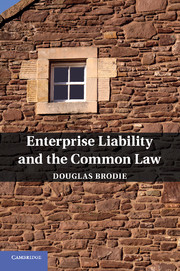Book contents
- Frontmatter
- Contents
- Preface
- Abbreviations
- 1 Introduction
- 2 The reception of Bazley v Curry
- 3 Enterprise risk
- 4 The risk and the individual
- 5 The enterprise
- 6 The borrowed employee
- 7 Independent contractors
- 8 Transferring the burden: the employer's right of indemnity
- 9 Risk and the employment relationship
- 10 Enforcement of the employment contract
- 11 Enterprise liability and non-delegable duties
- 12 Fundamental obligations
- 13 Concluding remarks
- Index
10 - Enforcement of the employment contract
Published online by Cambridge University Press: 17 November 2010
- Frontmatter
- Contents
- Preface
- Abbreviations
- 1 Introduction
- 2 The reception of Bazley v Curry
- 3 Enterprise risk
- 4 The risk and the individual
- 5 The enterprise
- 6 The borrowed employee
- 7 Independent contractors
- 8 Transferring the burden: the employer's right of indemnity
- 9 Risk and the employment relationship
- 10 Enforcement of the employment contract
- 11 Enterprise liability and non-delegable duties
- 12 Fundamental obligations
- 13 Concluding remarks
- Index
Summary
Enforcement of the employment contract raises a number of interesting issues. Traditionally – stemming from the hugely influential decision in Addis v Gramophone – contracting parties in a variety of jurisdictions have been unable to recover damages for injury to feelings. In the field of commercial law this approach to recovery for mental distress remains uncontroversial. The courts assume that the parties take the risk of injury to feelings arising in the event of breach by the other side. Such an allocation of risk in employment relations is much more questionable. This is particularly so if it is accepted that the employment contract can no longer be characterised as commercial in nature. In my view any such characterisation is outmoded: the employment contract ‘is not a simple commercial exchange in the marketplace of goods or services. A contract of employment is typically of a longer term and more personal in nature than most contracts, and involves greater mutual dependence and trust, with a correspondingly greater opportunity for harm or abuse.’ Given the nature of the employment relationship it cannot be assumed that an employee accepts the sorts of risks that commercial parties do. Indeed it may be said that nowadays employees do not expect to be treated in a humiliating or degrading fashion by their employer. Similarly flawed would be any attempt to defend Addis on the basis of remoteness.
- Type
- Chapter
- Information
- Enterprise Liability and the Common Law , pp. 139 - 148Publisher: Cambridge University PressPrint publication year: 2010



